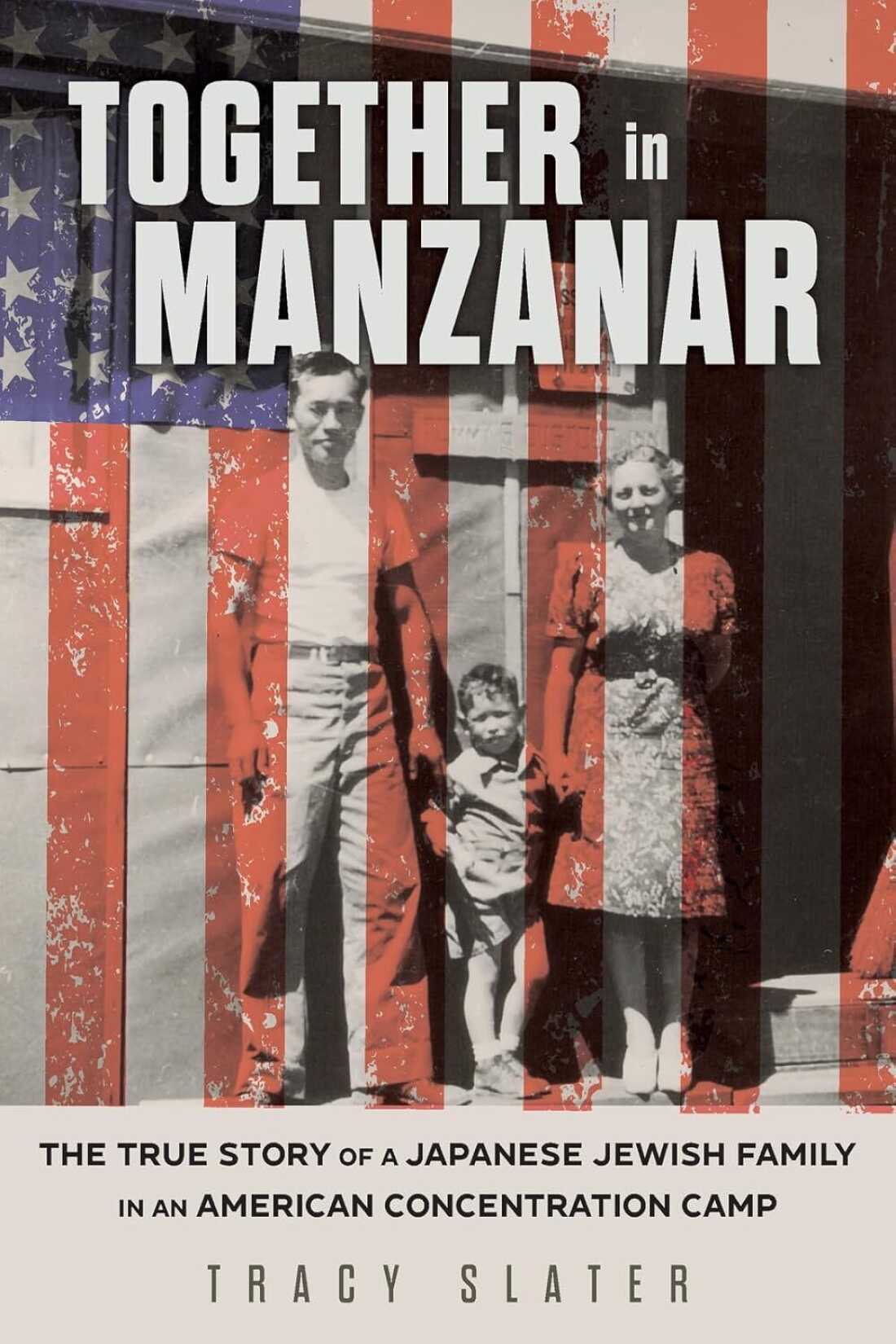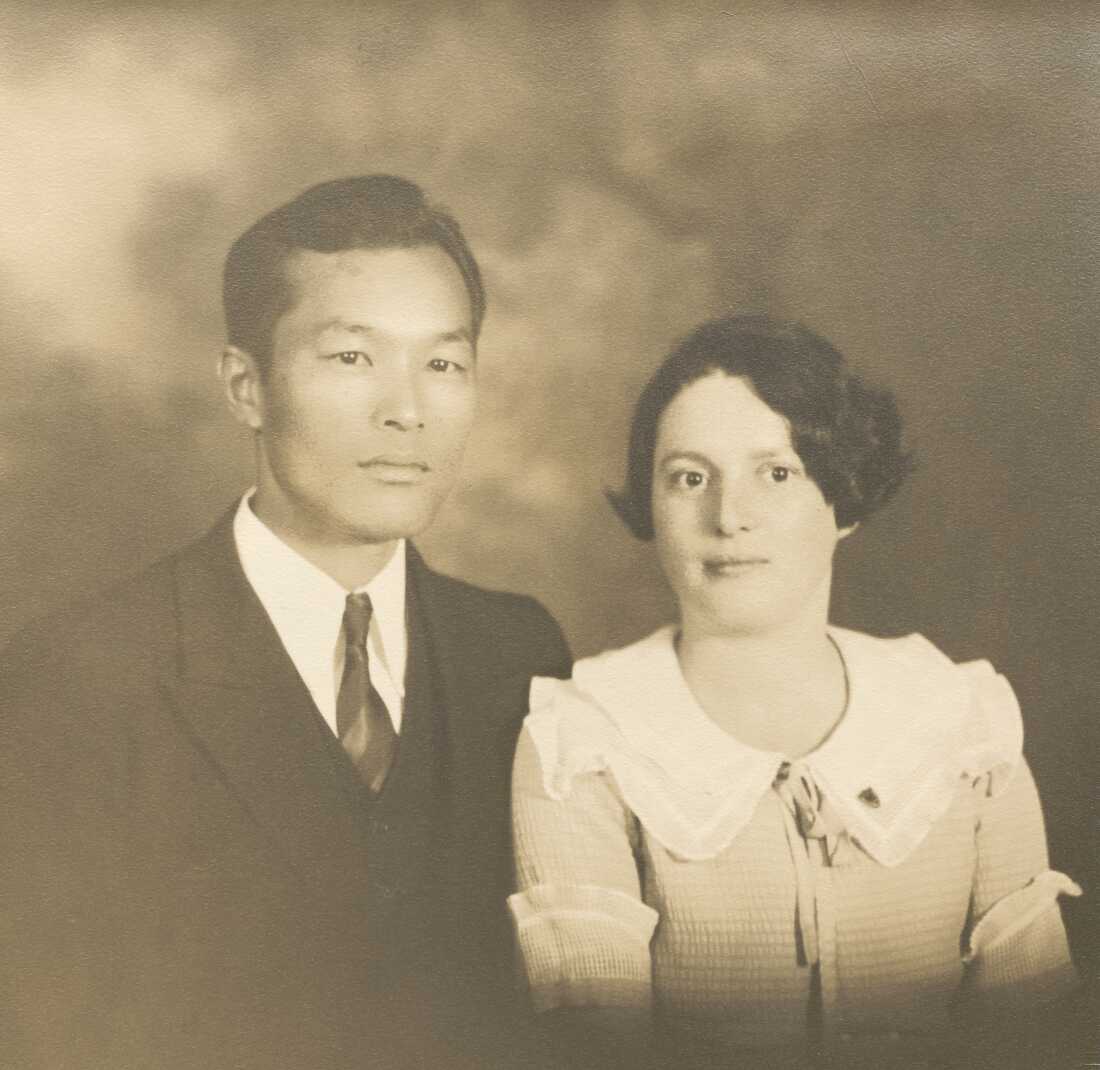Karl Yoneda and Elaine Buchman, March 1933. The couple would later be incarcerated with their son on the Manzanar focus camp throughout World Struggle II.
The Karl G. Yoneda Papers, UCLA Particular Library Collections.
cover caption
toggle caption
The Karl G. Yoneda Papers, UCLA Particular Library Collections.
In 1942, the mom of a toddler was given a surprising order: She was informed that her baby have to be despatched to a detention facility with out her. That was the real-life dilemma confronted by the principle character of Collectively in Manzanar: The True Story of a Japanese Jewish Household in an American Focus Camp, a brand new ebook by Tracy Slater.
It takes place when the USA was reeling from Japan’s assault on Pearl Harbor and started rounding up individuals of Japanese descent. In February 1942, two months after the assault, President Franklin D. Roosevelt issued an govt order authorizing the pressured removing and incarceration of Japanese People throughout World Struggle II.
The lady on the middle of Slater’s story, Jewish American labor activist Elaine Buchman Yoneda, selected to go to a focus camp together with her half-Japanese son, Tommy, leaving her white daughter, Joyce, behind.
After the camps closed, Elaine and her husband, indignant about what occurred, campaigned for reparations. However later in life, they questioned whether or not they had been too compliant, whether or not they need to have pushed again tougher. As Slater places it, “I think it was understandably hard for them to make peace with some of the choices that they made, given that there were no good choices at the moment.”
Slater spoke with NPR’s Sacha Pfeiffer on Morning Version about Yoneda’s journey to Manzanar and what life was like on the camp.
That is Slater’s second ebook, launched July 8. Her first was a memoir, The Good Shufu: Discovering Love, Self, and Residence on the Far Aspect of the World, about her expertise marrying a Japanese man and shifting to Japan.
This interview has been edited for size and readability.


Interview highlights
Sacha Pfeiffer: Would you describe Elaine’s frame of mind as she was wrestling with that excruciating determination [whether to let her son go to Manzanar alone]?
Tracy Slater: I feel Elaine felt like she had nowhere to show. I feel she knew that there was no retaining Tommy out of Manzanar, that the prospect she would discover a way out of this dilemma she was in was not attainable.
Pfeiffer: You write that in some methods she did not suppose there was a choice to make in any respect — that the choice she needed to make was very clear.
Slater: I feel she knew logistically that she couldn’t let the military take her 3-year-old son to Manzanar with out her as a result of, to begin with, I feel she couldn’t think about being with out him. And second of all, he was fairly ailing from the time he was born. So I feel she knew that he was a extremely susceptible baby and could not think about sending him to detention in a desert with out her.
Pfeiffer: Elaine’s husband, Karl, was a U.S. citizen born within the U.S., however that did not spare him from being rounded up as a result of he was of Japanese descent. So the U.S. was in a fairly unforgiving frame of mind.
Slater: Sure. The U.S. mandated that anyone with, within the phrases of 1 official, even one drop of Japanese blood, no matter citizenship standing, no matter age, no matter well being standing, have to be rounded up and despatched to camp.
Pfeiffer: However Elaine’s son was a 3-year-old boy. What risk may a child pose? Why require youngsters to go as properly?
Slater: There by no means was any rationalization past that, within the phrases of John DeWitt [a U.S. Army general who oversaw the incarceration of Japanese Americans during World War II], and I am paraphrasing right here considerably, the Japanese race is an enemy race. And regardless of the place a Japanese particular person is born or who they’re or how outdated they’re, they are a risk they usually must be eliminated. It is actually arduous to think about that this went over. However it did. And it resulted in [approximately] 120,000 Japanese People, about two-thirds of whom had been Americans, being incarcerated in focus camps.
Pfeiffer: Would you give an outline of what life in these camps was like?
Slater: It was very, very desolate and really, very unfit for habitation. There was a sewer ditch that ran alongside a set of barracks, and a few transportable bogs that had been pulled forwards and backwards between barracks for individuals to make use of after which emptied into the ditch. There may very well be households of ten or extra squished into these barrack rooms with typically one other household. There was one form of heating range after which a unadorned mild bulb. The meals often made individuals ailing as a result of it spoiled.
Pfeiffer: What has researching and scripting this ebook made you consider what’s taking place within the U.S. immediately in relation to immigrants and immigration?
Slater: That is the true story of an American household that bought swept up within the maelstrom of an inflection level in our historical past, and there is quite a lot of methods through which that is much like an inflection level that we’re in now. When the idea of pressured removing and incarceration was first being mentioned amongst politicians and authorities officers, it was mentioned as a coverage to deal with Japanese immigrants. It in a short time morphed right into a dialogue of incarcerating your entire Japanese American group, two-thirds of whom had been U.S. residents. So I feel we have now not only a proper, however a knowledge in being concerned in regards to the potential course that we’re getting in with this brutal crackdown even on immigration. I additionally suppose that the shortage of care about how insurance policies have an effect on individuals, borne out of worry and false narratives about who and what’s harmful, has traditionally led to some actually tragic, darkish durations in our historical past. So I feel, as a nation, we must be actually cautious with what’s taking place now and with the potential that it may lead us even additional right into a darker chapter.
This broadcast interview was edited by Ally Schweitzer, with the digital model edited by Majd Al-Waheidi.




